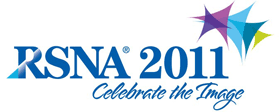
Abstract Archives of the RSNA, 2011
LL-BRS-WE5B
Increased Experience with Soft Copy Reporting May Reduce Expert Specificity
Scientific Informal (Poster) Presentations
Presented on November 30, 2011
Presented as part of LL-BRS-WE: Breast Imaging
Patrick C Brennan PhD, Presenter: Nothing to Disclose
John Ryan PhD, Abstract Co-Author: Director, Vizovo Ltd and Vizovo Inc
Elaine Ryan PhD, MSc, Abstract Co-Author: Nothing to Disclose
Warren Michael Reed BS, Abstract Co-Author: Nothing to Disclose
Mariusz W Pietrzyk PhD,MSc, Abstract Co-Author: Nothing to Disclose
Jennifer Norma Cawson MBBS, Abstract Co-Author: Nothing to Disclose
Warwick Lee MBBS, Abstract Co-Author: Nothing to Disclose
Variations in the performance of expert breast readers are well reported, but key reader characteristics explaining such variations are not fully explored. This large study aims to monitor diagnostic efficacy amongst mammography readers and identify parameters linked to higher levels of performance.
60 cases, 20 of which contained a cancer and each comprising 4 images were shown to radiologists (n=129), breast physicians (n=16) and radiographers (n=5) all employed in breast reading activities as part of their clinical duties. Each individual was asked to identify and locate any visualized malignancies and provide a confidence rating using a scale of 1-4. All images were displayed using 5MP monitors, supported by radiology workstations with full image manipulation facilities and a jackknifing free response (JAFROC) methodology was employed. Details were obtained from each radiologist regarding experience, qualifications, breast reading activities and physical characteristics and these were correlated against JAFROC scores using Spearman techniques.
As might be expected, higher performance was directly related to numbers of years professionally qualified (r= 0.18; p=0.04), number of years reading breast images (r= 0.24; p=0.007), number of mammography images read per year (r= 0.31; p=0.0003) and number of hours reading mammographic images per week (r= 0.2; p=0.02;). Unexpectedly, higher performance was inversely linked to previous experience with soft copy images (r= 0.17; p=0.05) and further analysis, demonstrated that this finding was due to changes in specificity.
The suggestion that familiarity with soft copy reporting may reduce expert ability to correctly identify normal appearances requires further investigation.
Optimisation of breast imaging reporting is critical to the diagnosis and management of patients with breast cancer.
Brennan, P,
Ryan, J,
Ryan, E,
Reed, W,
Pietrzyk, M,
Cawson, J,
Lee, W,
Increased Experience with Soft Copy Reporting May Reduce Expert Specificity. Radiological Society of North America 2011 Scientific Assembly and Annual Meeting, November 26 - December 2, 2011 ,Chicago IL.
http://archive.rsna.org/2011/11034439.html

